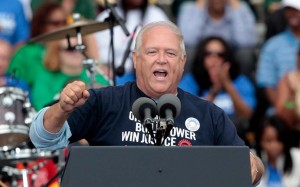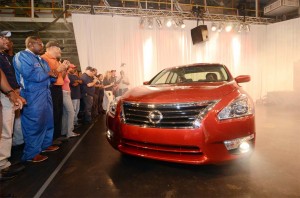
UAW President Dennis Williams said the union supports President Donald Trump's message of "Buy American."
Politics can make for strange bedfellows. So can union organizing drives.
Traditionally a stalwart force for the Democratic Party, and a major backer of the Hillary Clinton presidential campaign last year, the United Auto Workers Union has done something of an about face. At a Thursday news conference in Detroit, UAW boss Dennis Williams offered praise for President Trump – the president’s criticism of Mexican auto production, in particular – and said the union is ready to launch a new “Buy American” ad campaign.
The union’s position is not entirely surprising. In fact, it reflects the reason why many members reportedly voted for Trump last November. But the shift at UAW headquarters also comes as the union amps up its efforts to organize workers at a number of non-union auto plants, most of them in the South, where organized labor has seldom been welcome – and where candidate Trump far outpolled his Democratic rival for president.
Declaring that he is “very interested in some of the things he (Trump) is doing,” UAW President Williams insisted the “Buy American” movement is alive and well, and that the union is “in discussions” to launch a TV ad campaign supporting it. Noting that there are a number of efforts underway to penalize companies for their political views, Williams added that, “The boycott may be coming back,” and could be a tool to force both retailers and manufacturers to focus on American-made goods.
Ironically, many foreign-owned automotive manufacturers have embraced the call to build their products where they sell them. Each of the three largest Japanese automakers now produce the majority of the vehicles they market in the U.S. in American factories. But none of those so-called “transplants” are unionized.
The UAW has repeatedly failed with its organizing efforts. Only a few votes have been scheduled, and only one has earned the UAW a place on the plant floor. But even at the Volkswagen assembly line in Chattanooga, Tennessee, it represents only some of the factory’s hourly employees. And VW is fiercely resisting UAW efforts to win over skilled trades workers.

Supporting President Trump could hurt the UAW's chance of organizing Nissan's Canton, Mississippi, plant in the future.
Separately, the union continues probing and pushing organizing efforts at a number of other transplants, primarily those owned by the Japanese. UAW officials have said their biggest opportunity appears to be the huge Nissan facility in Canton, Mississippi.
To some observers, it’s a long-shot. After all, two previous campaigns aimed at organizing the even bigger Nissan factory in Smyrna, Tennessee, failed badly, in 1989 and 2001.
But the UAW believes it has a better shot in Canton, where about 80% of the workers are African-American and it has gotten the backing of numerous local churches and civil rights leaders, as well as worker advocates. Actor and activist Danny Glover has also come to the UAW’s aid.
(UAW gearing up for organizing battle with Tesla. Click Here for the story.)
The union campaign has taken on a civil rights tone, insisting the Mississippi workers are being underpaid and overworked. But Nissan insists its wages are well above the regional average, adding in a statement that, “Our 6,400 employees have safe, stable jobs, with some of the highest wages and strongest benefits in the state of Mississippi.”
Taking a stand more in line with President Trump could work in many parts of the South, including Tennessee, but several observers cautioned the UAW could actually generate some resistance among more pro-Democratic black workers in Mississippi, even though the state is, on the whole, solidly Republican.
UAW chief Williams’ pro-Trump comments could also receive a less welcome response in heavily Democratic California, where the union now sees a solid shot at organizing the Tesla plant. The factory, once part of a unionized joint venture between General Motors and Toyota, lost its labor certification when it was briefly shuttered before being sold to Tesla.
The factory produced just under 100,000 vehicles in 2016, and Tesla CEO Elon Musk hopes to boost that to 500,000 by 2018 with the launch of the mainstream-priced Model 3 battery-electric vehicle. The UAW clearly would like to get a vote scheduled before then because it has found new workers, happy to get a factory job, are less likely to approve a union, several observers have noted.
(Click Here for details about how politics are creating a minefield for the auto industry.)
The organizing drive at Tesla came into the spotlight recently, when worker Jose Moran decided to go public with his support for the UAW, complaining about both pay and working conditions at the factory in Fremont, a suburb of San Francisco.
“Although the cost of living in the Bay Area is among the highest in the nation, pay at Tesla is near the lowest in the automotive industry,” Moran wrote. “We need better organization in the plant, and I, along with many of my coworkers, believe we can achieve that by coming together and forming a union.”
Moran said he would like Tesla to accept a union, but the company has responded harshly. It has accused the activist of secretly being on the UAW’s payroll, something the union denies. The dispute may be settled by a petition drive. With enough signatures, a vote by workers will be required.
But in staunchly blue – and traditionally pro-union — California, the UAW’s newfound respect for Trump could become a countervailing issue. Of course, it could also be complicated by the fact that Tesla CEO Elon Musk joined the president’s economic advisory board, a move that has led to some advance orders for the Model 3 being cancelled.
UAW chief Williams took pains to insist the union hasn’t completely reversed decades of loyal Democratic support. While he may be “interested in” the president’s pro-American manufacturing policies, the union leader said he is also “very concerned” about other Trump policies, notably the immigration and travel ban.
(To see more of the views that the UAW and Trump share, Click Here.)
“It’s very dangerous to single out individual groups based on religion,” Williams said. “It’s un-American.”
